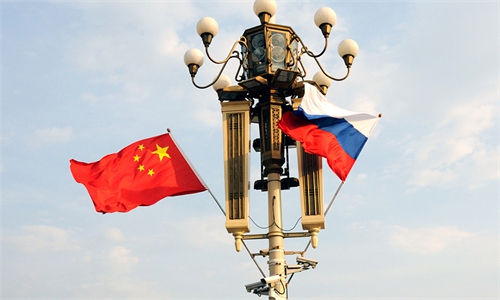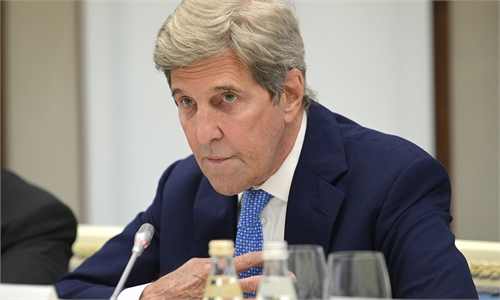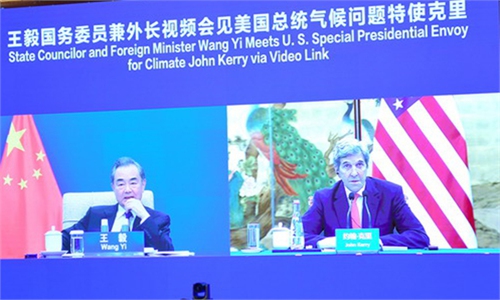China on multiple occasions urges US to rectify 'toxic' political atmosphere that obstructs cooperation
China-Russia ties 'seamless' to uphold world order facing hegemony
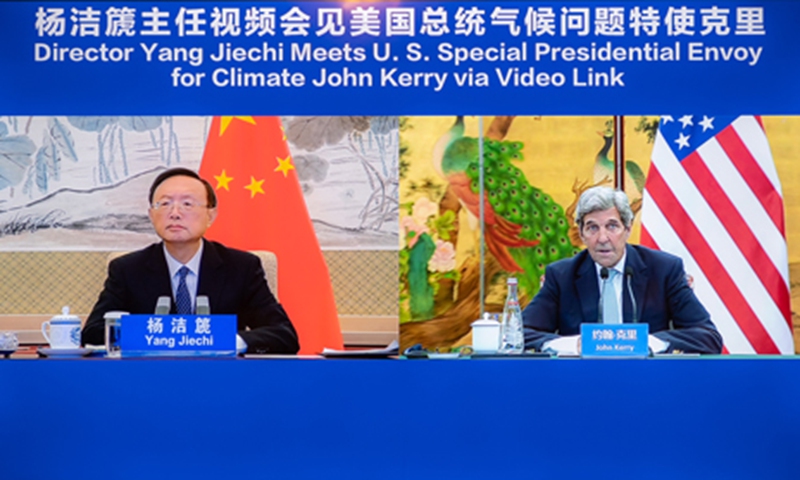
Photo: fmprc.gov.cn
On various occasions, senior Chinese diplomats have urged the US to put a lid on its "toxic" political atmosphere at home and stop treating China as a threat and opponent, which analysts said sends a clear signal to Washington that healthy bilateral relations are key to further cooperation on every front.
During a video meeting with US Special Presidential Envoy for Climate John Kerry on Thursday, Yang Jiechi, a member of the Political Bureau of the Central Committee of the Communist Party of China (CPC), said that for quite a time, China-US relations have encountered severe difficulties, due to US wrongdoings that interfere in China’s domestic affairs and damage China’s interests. Yang said that China-US confrontation does good to no one, and urged the US to rationally view bilateral relations and meet China half way.
China is open to dialogue and pragmatic cooperation with the United States, said Yang, who is also director of the Office of the Foreign Affairs Commission of the CPC Central Committee, noting that the two countries can enhance coordination and cooperation on a broad range of issues including climate change, COVID-19 control and economic recovery.
"At the same time, such cooperation must be two-way and mutually beneficial," he added.
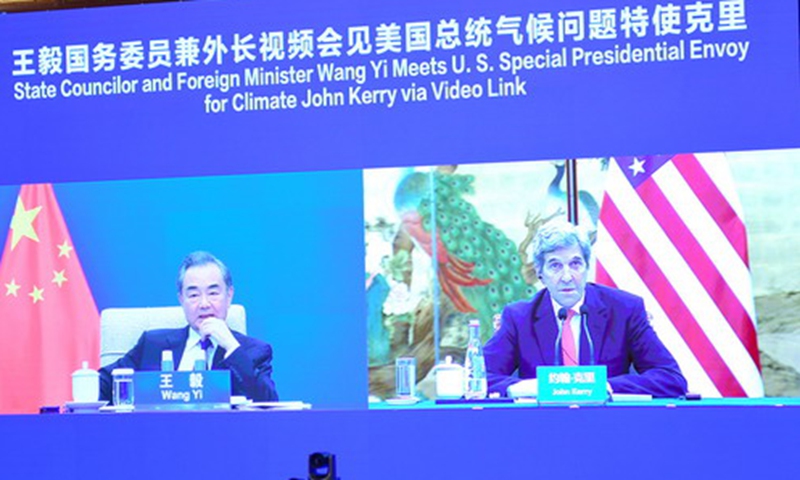
Photo: fmprc.gov.cn
Before meeting with Yang, Kerry also talked with State Councilor and Foreign Minister Wang Yi in a video call, during which Wang said that relations between China and the US have spiraled downward, and the US strategic misjudgment about China is the culprit. Wang said that the ball is in the US' court to stop regarding China as a threat and opponent and suppressing China all over the world.
The US wants to turn climate cooperation into an "oasis" in China-US relations. But if the oasis is surrounded by a desert, it would be desertified soon, said Wang.
Kerry also met with Chinese Vice Premier Han Zheng who told the US climate envoy that coping with climate change is a crucial part of China-US cooperation, and that he hopes the US will stick to the spirit of the telephone conversation between the two countries' leaders, create a good atmosphere for cooperation.
Kerry is visiting China to seek collaboration on climate change, when bilateral ties have hit a nadir in decades. But Washington only began to reach out to China for cooperation when facing several fiascos at home and abroad.
Chinese Ambassador to the United States Qin Gang said on Tuesday that China and the United States "should not go for misunderstanding, misjudgment, conflict or confrontation," and the wrong beliefs on China-US relations were absurd and dangerous.
Analysts said that different from his previous visit in April, Kerry's current visit comes amid the US facing several fiascos at home and abroad, and serves as a "water-testing" attempts to see if cooperation with China can be enhanced beyond the global warming issue.
They also opined that both Wang and Han's remarks formally admonished the US to discard its wishful thinking of cooperation on one hand and hurting China's interests on the other; and to change its own "toxic" political climate first before it hopes to enhance cooperation on tackling global warming or other issues.
US President Joe Biden's approval rating dropped 7 percentage points and hit its lowest level so far as the US-backed Afghan government in an upheaval that sent thousands of civilians and allies fleeing the country, according to a Reuters/Ipsos poll published in mid-August.
"It is time for the US government to reflect on its ability to handle foreign affairs," Lü Xiang, a research fellow at the Chinese Academy of Social Sciences in Beijing, told the Global Times.
Experts pointed out that the Biden administration is eyeing achievements on climate change cooperation to score. Otherwise it will face a perilous situation in the midterm elections next year.
Yet instead of smoothening ties, the US president is continuing to incite conflicts. During a speech Biden made after the US concluded withdrawing its troops from Afghanistan on Tuesday, he said that "a critical thing to understand: The world is changing. We're engaged in a serious competition with China. We're dealing with the challenges on multiple fronts with Russia."
To cope with Washington's aggression has further consolidated the already warm ties between China and Russia, said Lü, noting that ties between the two neighboring countries are "seamless" and "unprecedentedly important," given Beijing and Moscow's accordance on several international issues and cooperation to maintain world order, upholding multilateralism and offsetting the impact of hegemony.
In response to a question on the Russian Deputy Minister of Foreign Affairs' proposal of holding a meeting with the US, China and Pakistan in Kabul, Afghanistan's capital, in discussing the Afghan issue, Chinese Ministry of Foreign Affairs spokesperson Wang Wenbin said on Thursday that solving Afghanistan's problem needs international society's cooperation and support.
China has been keeping close contact with relevant parties regarding this problem, and is having in-depth negotiations and cooperation with Russia on this issue.
During a phone call with Russian President Vladimir Putin on August 25, Chinese President Xi Jinping said China is willing to strengthen communication and coordination with Russia and the international community on the Afghan issue and that China respects Afghanistan's sovereignty, independence and territorial integrity, insists on not interfering in its domestic affairs, and has always played a constructive role in promoting a political solution to the Afghan issue.
Given China and Russia's regional and international influence, the two countries can positively push forward Afghanistan's reconstruction and peace talks, Yang Jin, an associate research fellow at the Institute of Russian, Eastern European and Central Asian Studies under the Chinese Academy of Social Sciences, told the Global Times.
The expert said the US has realized China and Russia's influence over the issue, and the fact that it cannot exclude those two powers from negotiations over Afghan issue.
Experts said that the US has been repeatedly and vocally hyping China and Russia as the threat to democracy, yet many cases, including the US' bungling of COVID-19 and embarrassing withdrawal from Afghanistan, have proven it wrong, and when it faces serious fiascos, it comes to realize that cooperation with China and Russia on many fronts, including Afghanistan and climate change, are indispensable.
Last year, China and Russia, the two countries that paid the heaviest price for the ultimate victory of the World War II, held a grand celebration on September 3, the 75th anniversary of V-Day. Russia even moved the date to mark the end of World War II from September 2 to September 3, the same day as China's.
Yang said China and Russia firmly uphold the legacy of the victory in WWII, which also includes fighting hegemony and unilateralism.
As the world faces great changes unseen in a century, US unilateralism and bullying have become the greatest challenge to the postwar international order, and "that's why cooperation between China and Russia is of utmost importance in maintaining international order and justice," Yang noted.
Analysts said that different from his previous visit in April, Kerry's current visit comes amid the US facing several fiascos at home and abroad, and serves as a "water-testing" attempts to see if cooperation with China can be enhanced beyond the global warming issue.
They also opined that both Wang and Han's remarks formally admonished the US to discard its wishful thinking of cooperation on one hand and hurting China's interests on the other; and to change its own "toxic" political climate first before it hopes to enhance cooperation on tackling global warming or other issues.
US President Joe Biden's approval rating dropped 7 percentage points and hit its lowest level so far as the US-backed Afghan government in an upheaval that sent thousands of civilians and allies fleeing the country, according to a Reuters/Ipsos poll published in mid-August.
"It is time for the US government to reflect on its ability to handle foreign affairs," Lü Xiang, a research fellow at the Chinese Academy of Social Sciences in Beijing, told the Global Times.
Experts pointed out that the Biden administration is eyeing achievements on climate change cooperation to score. Otherwise it will face a perilous situation in the midterm elections next year.
Yet instead of smoothening ties, the US president is continuing to incite conflicts. During a speech Biden made after the US concluded withdrawing its troops from Afghanistan on Tuesday, he said that "a critical thing to understand: The world is changing. We're engaged in a serious competition with China. We're dealing with the challenges on multiple fronts with Russia."
To cope with Washington's aggression has further consolidated the already warm ties between China and Russia, said Lü, noting that ties between the two neighboring countries are "seamless" and "unprecedentedly important," given Beijing and Moscow's accordance on several international issues and cooperation to maintain world order, upholding multilateralism and offsetting the impact of hegemony.
In response to a question on the Russian Deputy Minister of Foreign Affairs' proposal of holding a meeting with the US, China and Pakistan in Kabul, Afghanistan's capital, in discussing the Afghan issue, Chinese Ministry of Foreign Affairs spokesperson Wang Wenbin said on Thursday that solving Afghanistan's problem needs international society's cooperation and support.
China has been keeping close contact with relevant parties regarding this problem, and is having in-depth negotiations and cooperation with Russia on this issue.
During a phone call with Russian President Vladimir Putin on August 25, Chinese President Xi Jinping said China is willing to strengthen communication and coordination with Russia and the international community on the Afghan issue and that China respects Afghanistan's sovereignty, independence and territorial integrity, insists on not interfering in its domestic affairs, and has always played a constructive role in promoting a political solution to the Afghan issue.
Given China and Russia's regional and international influence, the two countries can positively push forward Afghanistan's reconstruction and peace talks, Yang Jin, an associate research fellow at the Institute of Russian, Eastern European and Central Asian Studies under the Chinese Academy of Social Sciences, told the Global Times.
The expert said the US has realized China and Russia's influence over the issue, and the fact that it cannot exclude those two powers from negotiations over Afghan issue.
Experts said that the US has been repeatedly and vocally hyping China and Russia as the threat to democracy, yet many cases, including the US' bungling of COVID-19 and embarrassing withdrawal from Afghanistan, have proven it wrong, and when it faces serious fiascos, it comes to realize that cooperation with China and Russia on many fronts, including Afghanistan and climate change, are indispensable.
Last year, China and Russia, the two countries that paid the heaviest price for the ultimate victory of the World War II, held a grand celebration on September 3, the 75th anniversary of V-Day. Russia even moved the date to mark the end of World War II from September 2 to September 3, the same day as China's.
Yang said China and Russia firmly uphold the legacy of the victory in WWII, which also includes fighting hegemony and unilateralism.
As the world faces great changes unseen in a century, US unilateralism and bullying have become the greatest challenge to the postwar international order, and "that's why cooperation between China and Russia is of utmost importance in maintaining international order and justice," Yang noted.

